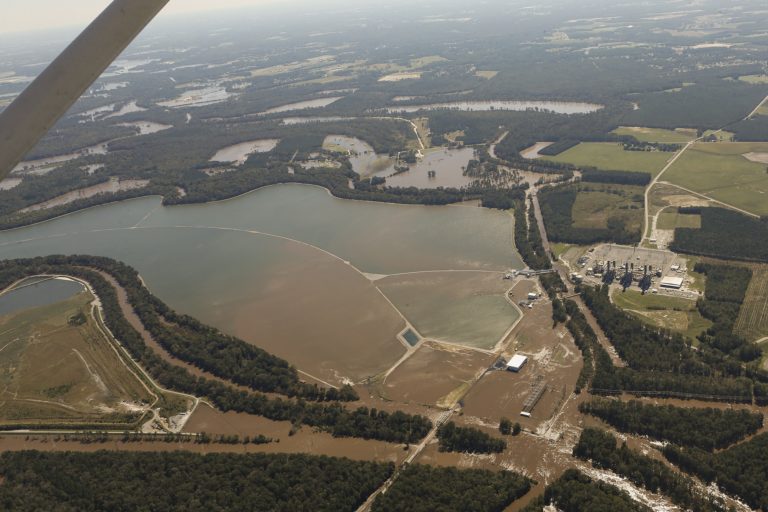Waterkeeper Alliance and North Carolina Riverkeepers Respond to Hurricane Matthew Flooding in North Carolina
By: Waterkeeper Alliance

Offering opportunities for aerial flights over impacted areas
RALEIGH, NORTH CAROLINA — As treacherous floods continue to devastate North Carolina in the wake of Hurricane Matthew, Waterkeeper Alliance and 13 North Carolina Riverkeeper organizations are actively working to document the potential devastating impacts of flooded coal ash ponds, factory swine, and poultry facilities on the state’s waterways.
The combined impacts of flooded coal ash ponds, factory swine, and poultry facilities have the potential to deliver a devastating triple whammy to the state’s waterways. Hardest hit will be the Neuse and Cape Fear river basins, as they have the highest concentration of these massive industrial sites with waste ponds larger than football stadiums.
Waterkeeper Alliance and the Riverkeeper organizations have already captured photos that show the submersion of industrial waste ponds at the Lee coal-fired power plant and at many industrial meat facilities. They are keeping close watch on the potential for the waters to rise over coal ash ponds and mix with river water, carrying the toxic waste downstream or being spilled directly into the Neuse River impacting communities. The organizations are also closely monitoring industrial meat production facilities where threats to water quality and human health are increasing as floodwaters inundate fields, drown animals in barns, and threaten to breach waste lagoons.
North Carolina environmental agencies permitted swine lagoons and coal ash ponds to be sited in the floodplains of the state’s rivers. Because of this, when storms with high rainfall occur, the state’s rivers become devastatingly polluted with coal ash and waste from industrial animal production facilities.
In 1999, the impacts from Hurricane Floyd dumped massive amounts of raw animal waste from industrial meat production facilities into the Neuse River. Current floods in North Carolina are likely to exceed the record levels set after Hurricane Floyd. The introduction of vast quantities of untreated waste into North Carolina’s waterways leaves tens of thousands of rural residents susceptible to air and water quality contamination. As climate change causes more and more of these devastating weather events, we simply cannot afford these continued assaults upon North Carolina’s waterways and communities.
** To arrange interviews with Waterkeeper Alliance staff and North Carolina Riverkeepers on the ground and in the air in their areas monitoring the conditions, contact: Tina Posterli, Waterkeeper Alliance, 516-526-9371, [email protected]
Click here to read about our North Carolina “Fields of Filth” report and connect to a map of all the poultry and swine farms in North Carolina.
The Waterkeeper Alliance Rapid Response Team initiative is an innovative solution that provides trusted and independent emergency response to disasters on our waterways. In a climate of lax federal regulations and extensive budget cuts to state departments of environmental conservation, the need for Waterkeepers to speak truth about the devastating impacts of water emergencies on communities has never been greater.North Carolina Riverkeepers will remain involved as long as necessary in order assure that proper clean-up, mitigation and enforcement is completed.